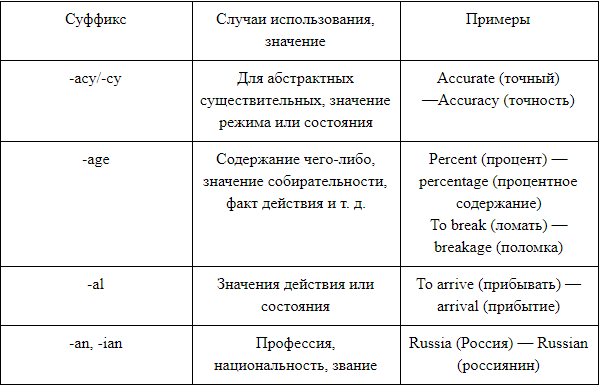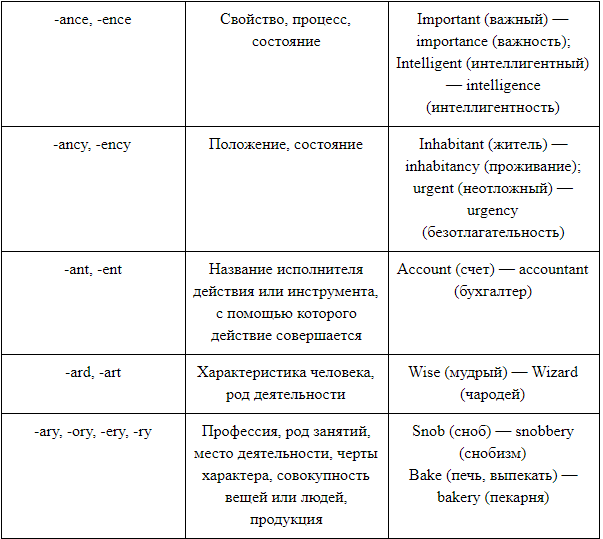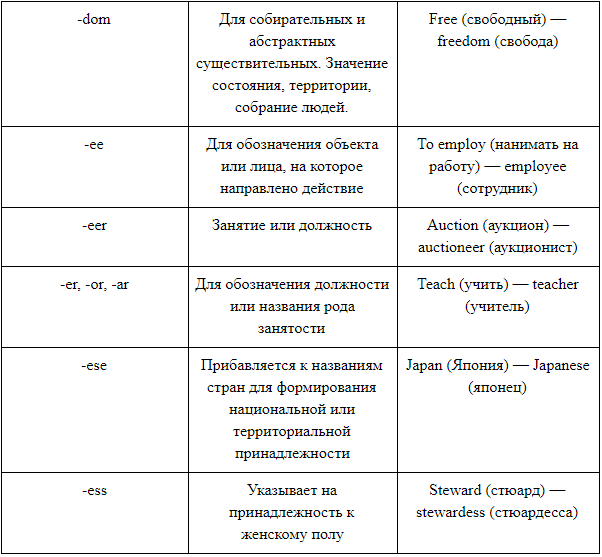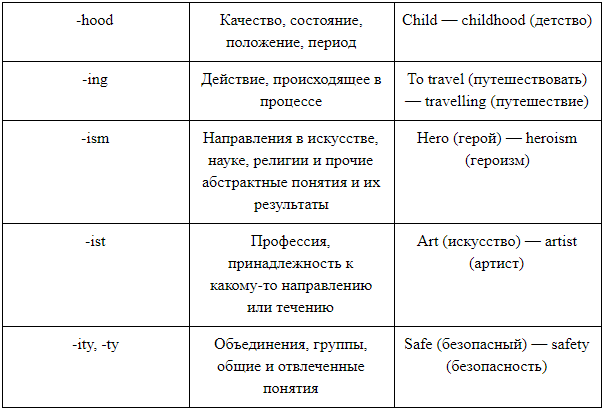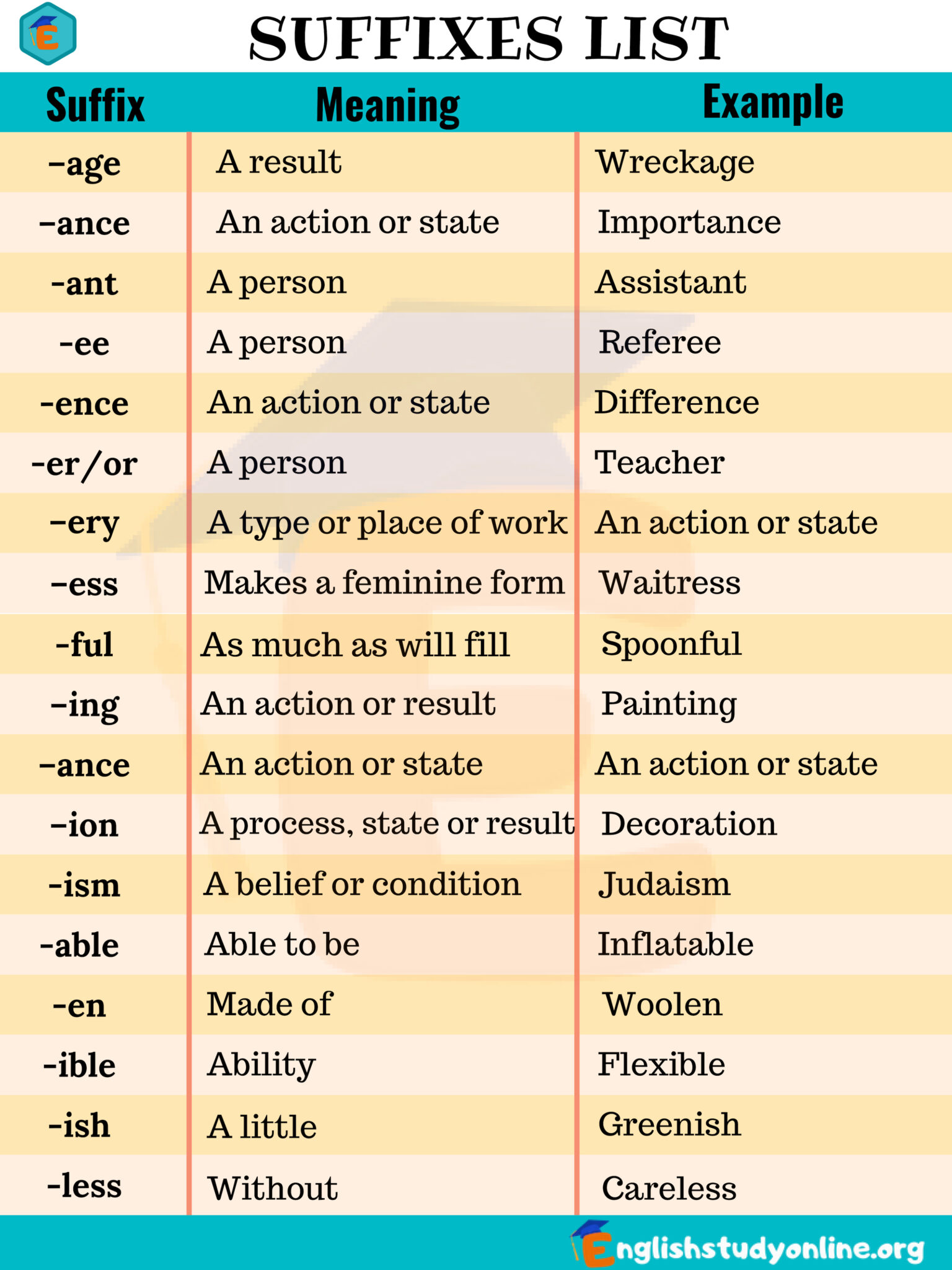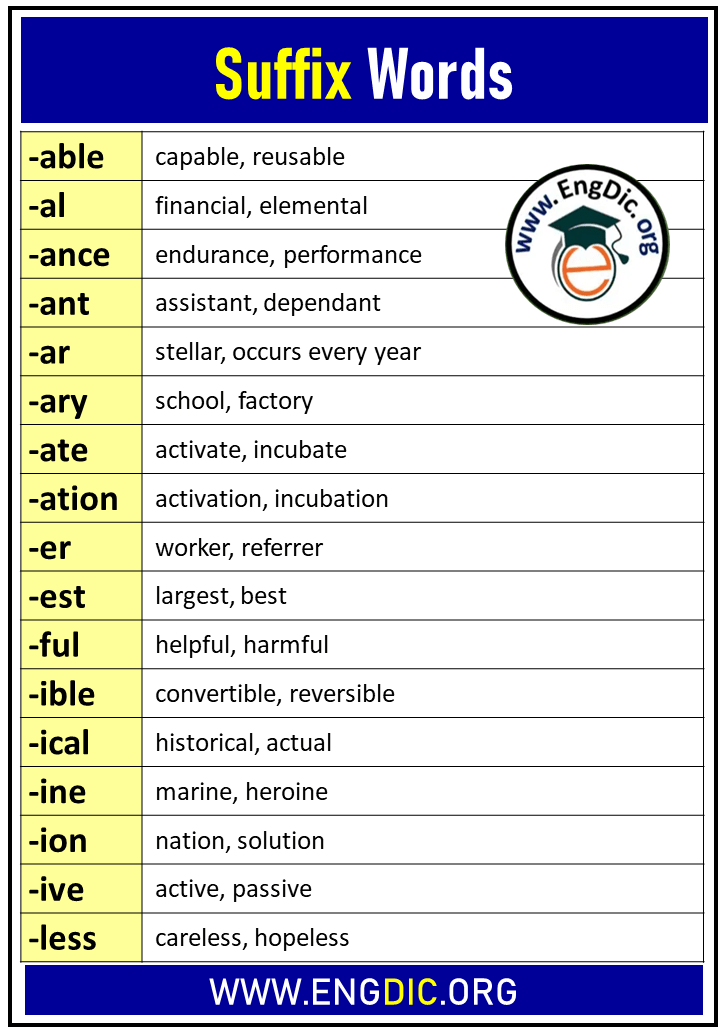👉 Prefix Meaning
Prefix is a letter or a group of letters that appears at the beginning of a word and changes the word’s original meaning.
Prefix Meaning Translation
English  |
Prefix is a letter or a group of letters that appears at the beginning of a word and changes the word’s original meaning. |
Spanish |
El prefijo es una letra o un grupo de letras que aparece al principio de una palabra y cambia su significado original. |
French |
Le préfixe est une lettre ou un groupe de lettres qui apparaît au début d’un mot et qui en modifie le sens initial. |
Italian |
Il prefisso è una lettera o un gruppo di lettere che appare all’inizio di una parola e cambia il significato originale della parola. |
German |
Eine Vorsilbe ist ein Buchstabe oder eine Gruppe von Buchstaben, die am Anfang eines Wortes erscheint und die ursprüngliche Bedeutung des Wortes verändert. |
Portuguese |
Prefixo é uma letra ou um grupo de letras que aparece no início de uma palavra e altera o significado original da palavra. |
Russian |
Префикс – это буква или группа букв, которая появляется в начале слова и изменяет его исходное значение. |
Chinese |
前缀是指出现在单词开头的一个字母或一组字母,它改变了单词的本义。 |
Japanese |
接頭辞とは、単語の先頭に現れ、その単語の本来の意味を変える文字または文字群のことです。 |
Polish |
Przedrostek to litera lub grupa liter, która pojawia się na początku słowa i zmienia jego pierwotne znaczenie. |
| Hungarian | Az előtag olyan betű vagy betűcsoport, amely egy szó elején jelenik meg, és megváltoztatja a szó eredeti jelentését. |
| Swedish | Prefix är en bokstav eller en grupp av bokstäver som står i början av ett ord och ändrar ordets ursprungliga betydelse. |
👉 Suffix Meaning
What is the Suffix?
Suffix is a letter or a group of letters that is usually added onto the end of words, to change the way a word fits into a sentence grammatically.
Suffix Meaning Translation
English  |
Suffix is a letter or a group of letters that is usually added onto the end of words, to change the way a word fits into a sentence grammatically. |
Spanish |
El sufijo es una letra o un grupo de letras que se suele añadir al final de las palabras, para cambiar la forma en que una palabra encaja gramaticalmente en una frase. |
French |
Le suffixe est une lettre ou un groupe de lettres qui est généralement ajouté à la fin d’un mot, afin de modifier la façon dont ce mot s’intègre dans une phrase sur le plan grammatical. |
Italian |
Il suffisso è una lettera o un gruppo di lettere che di solito viene aggiunto alla fine delle parole, per cambiare il modo in cui una parola si inserisce grammaticalmente in una frase. |
German |
Ein Suffix ist ein Buchstabe oder eine Gruppe von Buchstaben, die normalerweise an das Ende von Wörtern angehängt wird, um die Art und Weise zu ändern, wie ein Wort grammatikalisch in einen Satz passt. |
Portuguese |
Sufixo é uma letra ou um grupo de letras que é normalmente adicionado no final das palavras, para alterar a forma como uma palavra se encaixa numa frase gramaticalmente. |
Russian |
Суффикс – это буква или группа букв, которые обычно добавляются в конец слова, чтобы изменить способ грамматического вставки слова в предложение. |
Chinese |
后缀是一个字母或一组字母,通常加在单词的末尾,以改变一个单词在语法上与句子的配合方式。 |
Japanese |
Suffix(サフィックス)とは、通常、単語の末尾に付加される文字または文字群のことで、文法的に単語が文に収まる方法を変えるためのものです。 |
Polish |
Sufiks to litera lub grupa liter, która jest zazwyczaj dodawana na końcu słowa, aby zmienić sposób, w jaki słowo pasuje do zdania pod względem gramatycznym. |
| Hungarian | Az utótag olyan betű vagy betűcsoport, amelyet általában a szavak végére illesztenek, hogy megváltoztassák a szó nyelvtani beilleszkedését a mondatba. |
| Swedish | Suffix är en bokstav eller en grupp av bokstäver som vanligtvis läggs till i slutet av ett ord för att ändra hur ett ord passar in i en mening rent grammatiskt. |
Suffix Meaning Translation
Nouns, verbs, adjectives and adverbs all tend to use different suffixes, so this makes it a little easier to remember! Collectively, prefixes and suffixes are known as ‘affixes’.
Prefix Definitions
A prefix is a letter or a group of letters that attaches to the beginning of a word and helps to indicate or modify its meaning. An easy example would be the word ‘prefix’ itself! It begins with the prefix pre-, which means ‘before’.
It is quite important to understand what different prefixes mean as they can help to understand the meanings of any new vocabulary that you learn. However, you do need to be careful, as sometimes a prefix can have more than one meaning!
An example would be im-, this can mean ‘not’ or ‘into’.
Here is a list of the most common prefixes
👉 Prefix Examples
| PREFIX | MEANING | EXAMPLES |
|---|---|---|
| ante- | before | antenatal, anteroom, antedate |
| anti- | against, opposing | antibiotic, antidepressant, antidote |
| circum- | around | circumstance, circumvent, circumnavigate |
| co- | with | co-worker, co-pilot, co-operation |
| de- | off, down, away from | devalue, defrost, derail, demotivate |
| dis- | opposite of, not | disagree, disappear, disintegrate, disapprove |
| em-, en- | cause to, put into | embrace, encode, embed, enclose, engulf |
| epi- | upon, close to, after | epicentre, episcope, epidermis |
| ex- | former, out of | ex-president, ex-boyfriend, exterminate |
| extra- | beyond, more than | extracurricular, extraordinary, extra-terrestrial |
| fore- | before | forecast, forehead, foresee, foreword, foremost |
| homo- | same | homosexual, homonuclear, homoplastic |
| hyper- | over, above | hyperactive, hyperventilate |
| il-, im-, in-, ir- | not | impossible, illegal, irresponsible, indefinite |
| im-, in- | into | insert, import, inside |
| infra- | beneath, below | infrastructure, infrared, infrasonic, infraspecific |
| inter-, intra- | between | interact, intermediate, intergalactic, intranet |
| macro- | large | macroeconomics, macromolecule |
| micro- | small | microscope, microbiology, microfilm, microwave |
| mid- | middle | midfielder, midway, midsummer |
| mis- | wrongly | misinterpret, misfire, mistake, misunderstand |
| mono- | one, singular | monotone, monobrow, monolithic |
| non- | not, without | nonsense, nonentity, nondescript |
| omni- | all, every | omnibus, omnivore, omnipotent |
| para- | beside | parachute, paramedic, paradox |
| post- | after | post-mortem, postpone, post-natal |
| pre- | before | prefix, predetermine, pre-intermediate |
| re- | again | return, rediscover, reiterate, reunite |
| semi- | half | semicircle, semi-final, semiconscious |
| sub- | under | submerge, submarine, sub-category, subtitle |
| super- | above, over | superfood, superstar, supernatural, superimpose |
| therm- | heat | thermometer, thermostat, thermodynamic |
| trans- | across, beyond | transport, transnational, transatlantic |
| tri- | three | triangle, tripod, tricycle |
| un- | not | unfinished, unfriendly, undone, unknown |
| uni- | one | unicycle, universal, unilateral, unanimous |
METRIC SYSTEM PREFIXES
|
nano- |
0. 000 000 001 |
|
milli- |
0. 001 |
|
centi- |
0. 01 |
|
kilo- |
1000 |
|
mega- |
1000 000 |
|
giga- |
1000 000 000 |
|
tera- |
1000 000 000 000 |
Prefix nano-
The prefix nano- is used in the metric system. The prefix denotes a factor of one billionth.
Example:
- Nanometer
Prefix milli-
The prefix milli- is used in the metric system. It has only one use and it is to denote a factor of one thousandth.
Example:
- Millimeter
Prefix centi-
Centi- is a unit prefix in the metric system. It denotes a factor of one hundredth.
Examples:
- Centimeter, centigram, centiliter, etc.
Prefix kilo-
The prefix kilo- is a decimal unit prefix in the metric system. It denotes a multiplication of one thousand.
Examples:
- Kilogram, kilometer, kilojoule, kilobyte, kilobit, kiloohm, kilosecond, etc.
Prefix mega-
The prefix mega- can be used in two ways. The first is as a unit prefix in the metric system, and it describes one million units. The second is as an add-on for words to make them present something large.
Examples for metric system
- Megapixel, megahertz, megabyte, megawatt, megadeath, megaton, megameter, etc.
Examples for add-on:
- Mega-mass, mega-man, mega-important, mega-dope, mega-sized, etc.
Prefix giga-
The prefix giga- is used in the metric system to denote a factor of a billion. It is also commonly hyphenated in colloquial speech to describe something of great size.
Examples:
- Gigahertz, gigabyte, gigabit, giga-shroom, giga-power, giga-hamburger, giga-sized, etc.
Prefix tera- / Prefix for trillion
The prefix for trillion is tera-. Tera- is a unit prefix in the metric system.
Examples:
- Terawatt, terabyte, teralitre, terameter, terasecond, etc.
MEDICAL, BIOLOGY, CHEMISTRY, AND SCIENCE PREFIXES
|
epi- |
Biology and medicine – meaning: up, upon, over, etc. |
|
para- |
Science and medicine – meaning: on the side of, beside, etc. |
|
endo- |
Biology and Medicine – meaning: within |
|
eu- |
Biology and chemistry – meaning: good, well |
|
intra- |
Medicine and biology – meaning: within |
|
hemi- |
Medicine and biology – meaning: half |
|
hetero- |
Biology and social science – meaning: different, other |
|
trans- |
Chemistry and astronomy – meaning: across, over, beyond, etc. |
|
sub- |
Chemistry and science – meaning: under, below, beneath, etc. |
|
poly- |
Chemistry, biology, and music theory – meaning: many, much, etc. |
|
tetra- |
Chemistry, math, and geometry – meaning: four |
|
iso- |
Chemistry – meaning: equal |
|
di- |
Chemistry – meaning: two, twice, double |
|
mono- |
Chemistry and biology – meaning: singular, alone, one |
|
hyper- |
Science and astrology – meaning: abundant, exaggerated, etc. |
|
hypo- |
Medicine and biology – meaning: under |
|
peri- |
Biology and geography – meaning: around, about, etc. |
Prefix epi-
The prefix epi- is of Greek origin. It describes something that is on, upon, over, near, at before, or after something else. It is used across many sciences and disciplines, and is most common in biology and medicine,
Examples:
- Epicenter, epiblast, epidemic, epicarp, epiderm, epidural, epigene, epistasis, epidermis, epitome, epigraph, epigram, epipod, etc.
Prefix para-
The prefix para- is most commonly attached to verbs, and verb phrases. It means at one side of, or on the side of, as well as meaning beside, side by side, beyond, past, or describes something defective or inactive. It is used commonly in sciences and medicine.
Examples:
- Paradigm, parabola, paradox, parasitic, parallax, parameter, paranoia, paranormal, paraphernalia, parapraxis, parasite, paralegal, etc.
Prefix endo-
Endo- is a very simple prefix, and it means within. It is commonly used in biology, medicine, and other sciences.
Examples:
- Endobiotic, endocarp, endocrine, endoderm, endogenous, endomitosis, endomorph, endorphin, endoplasm, endospore, endotherm, etc.
Prefix eu-
The prefix eu- stems from Greek. It means something good, or well. It is commonly used in biology, medicine, and chemistry.
Examples:
- Eulogy, eucalyptus, euchlorine, euglycemia, eukaryote, euthanasia, euglena, eupeptic, eupnea, euthyroid, euthropic, euploid, etc.
Prefix intra-
The prefix intra- simply means within, and it is often associated with the prefix inter-. It is used to form compound words. The prefix intra- is also commonly used in biology and medicine.
Examples:
- Intravenous, intradermal, intracranial, intrada, intracardiac, intraclonal, intracodon, intray, intraocular, intrauterine, intrahost, intrasient, intraset, etc.
Prefix hemi-
The prefix hemi- is a simple one, and it means half. It is most commonly used in medicine and biology.
Examples:
- Hemiparesis, hemiplegia, hemithorax, hemihelix, hemicarbonic, hemicerebral, hemicoronal, heminode, hemiparesis, etc.
Prefix hetero-
The prefix hetero- simply means different, or other. It’s most commonly encountered in medicine and biology, as well as sometimes in social sciences.
Examples:
- Heterocyclic, heteromorphism, heterosexual, heterozygous, heterodox, heterogene, heteropod, heterochromatic, heterolateral, heterodiagenic, etc.
Prefix trans-
The prefix trans- is originally from Latin, and it’s very versatile in its use. It means something across, over, beyond, through, or changing. It is also used in chemistry, and astronomy, to denote distance. It also refers to something on the other side of something, and is used to describe one’s gender if it doesn’t align with the biologically assigned sex.
Examples:
- Transgression, translucent, transaction, transfixed, transatlantic, transcontinental, trans-Martian, trans-Neptunian, transsexual, transgender, translation, etc.
Prefix sub-
The prefix sub- comes from Latin and it is very simple, but versatile. It means under, below, beneath, slightly, nearly, imperfect, secondary, or subordinate. It is also commonly used in chemistry and other sciences.
Examples:
- Subject, subtract, subjugate, subnitrate, suboxide, subchloride, subplot, subcommittee, subvert, submerge, submarine, subscribe, subtropical, etc.
Prefix poly-
The prefix poly- means many, much, or in great number. It is very common in chemistry and biology, as well as music theory.
Examples:
- Polyandrous, polyethylene, polymorphic, polyglot, polymer, polyester, polycaliber, polycentric, polytonal, polychord, polycratic, etc.
Prefix tetra-
Tetra- is a numeral prefix, and it means four. It is used to denote a thing that consists of four parts. It is commonly used in various sciences, especially chemistry, math, and geometry.
Examples:
- Tetrameter, tetragon, tetrahelix, tetrahydride, tetraionic, tetrachloride, tetracube, tetracycline, tetraethyl, tetranuclear, etc.
Prefix iso-
The prefix iso- means equal. It is commonly used in chemistry to describe isometric compounds. It is also used in the formation of various compound words.
Examples:
- Isometric, isotope, isocyanic, isoalkene, isolate, isontropic, isoclonal, isocurve, etc.
Prefix di-
The prefix di- comes from Greek, and it means two, twice, or double. It is used in the formation of various compound words. It is commonly seen in chemistry.
Examples:
- Dipolar, disulfide, diatomic, dioxide, dialogic, diazepine, dicobalt, diacarboxyl, dibasal, dibenzonate, etc.
Prefix mono-
The prefix mono- means something singular, alone, or simply one. It is commonly used in various sciences.
Examples:
- Mononucleosis, monophonic, monogamy, monorail, monopoly, monotheism, monolayer, monohydrate, monotonous, monotone, monoplan, etc.
Prefix hyper-
The prefix hyper- comes from Greek. It is used to describe something that is abundant, it means over and denotes something in excess or something being exaggerated. It is used commonly in sciences to denote mass or space.
Examples:
- Hyperbole, hyperthyroid, hyperventilate, hypermass, hyperinflation, hyperactive, hypercatabolic, hyperchloric, hypercritical, hyperchronic, hyperlink, etc.
Prefix hypo-
Hypo is a very simple prefix that comes from Greek. It means under. It is commonly used in medical terms, as well as generally in sciences and various researches.
Examples:
- Hypodermic, hypoglycemia, hypochondria, hypoallergenic, hypothesis, hypocritical, hypocrite, hypocorism, hypogean, hypocaust, etc.
Prefix peri-
The prefix peri- comes from Greek. It means around, about, enclosing, surrounding, or near. It is commonly used in biology and geography.
Examples:
- Periphery, periscope, pericranial, peridigital, perifacial, perimeter, peripatetic, perimorph, periodontal, periosteum, perihelion, etc.
Chemistry Prefixes
In chemistry prefixes are used to name various compounds. These prefixes denote the number of a given element within a compound.
Prefixes:
- 1 – mono, 2 – di, 3 – tri, 4 – tetra, 5 – penta, 6 – hexa, 7 – hepta, 8 – octa, 9 – nona, 10 – deca
Examples:
- Nitrogen trihydride, copper sulfate pentahydrate, bicarbon sulfate, etc.
GRAMMATICAL PREFIXES
|
de- |
Privation, removal, separation, etc. |
|
inter- |
In between, among, together, etc. |
|
pro- |
Affinity to something, advancing, etc. |
|
ex- |
Our of, from, without |
|
un- |
Not, opposite meaning of the original word |
|
re- |
Again, repeating, back, etc. |
|
mis- |
Mistaken, wrong, incorrect, etc. |
|
con- |
Together, joined, etc. |
|
pre- |
Before, prior to, in front of, etc. |
|
im- |
Change meaning to the negative form of the original |
|
ad- |
To, towards, joining, etc. |
|
anti- |
Against, in opposition of something, etc. |
|
auto- |
Self, same, spontaneous, etc. |
|
pan- |
All, union of branches |
|
dia- |
Through, completely, going apart, etc. |
|
neo- |
New, fresh, young, etc. |
|
post- |
Behind, after, later, etc. |
|
ab- |
Away from |
|
bi- |
Twice, two |
|
co- |
Together, jointly, mutually |
|
en- |
Confine something in a place, etc. |
|
fore- |
Before, in front, superior |
|
retro- |
Before, backwards |
|
tele- |
Distance, measuring distance |
|
be- |
To exist |
|
an- |
Without, lacking, not |
Prefix de-
The prefix de- is of Latin origin. It is used to indicate privation, removal, separation, negation, descent, reversal, or intensity. The prefix de- is also added to verbs in order for them to mean the opposite of what they originally mean.
Examples:
- Decide, dehumidify, degrade, detract, deduce, decompose, decentralize, desensitize, deconstruct, demoralize, defrost, destroy, etc.
Prefix inter-
The prefix inter- comes from Latin. It describes something that is between, among, in the midst of, mutual, reciprocated, together, or active during an event. The prefix can be used to modify various types of words.
Examples:
- Interact, intercede, interlude, intercept, intersect, intercom, interim, interject, intermediate, international, internet, interrupt, intertwine, interview, etc.
Prefix pro-
Pro- is a very versatile prefix. It is used to describe an affinity for something. It can also describe priority in space and time, as well as denoting advancing, or indicating substitution.
Examples:
- Pro-British, pro-Communist, proactive, provision, prologue, proceed, produce, protract, procrastinate, proactive, prohibit, provoke, pronounce, etc.
Prefix ex-
The prefix ex- is simple to use, because it is most commonly hyphenated. It means out of, from, utterly, thoroughly, not, or without, and can indicate a former status or title.
Examples:
- Ex-wife, ex-boyfriend, ex-girlfriend, ex-member, ex-president, ex-convict, exodus, exhume, ex-husband, ex-Christian, etc.
Prefix un-
The prefix un- is simple to use because it only means not. It can be attached to all forms of words in order for them to mean the opposite of what they originally do.
Examples:
- Unfair, unemployed, unseen, unfeeling, uninformed, undisputed, unheard, unrest, unable, unhappy, uncooked, unzip, etc.
Prefix re-
The prefix re- is originally from Latin. It means again, or describes something that is being repeated, and it can also mean back, or backwards to denote a regression.
Examples:
- Regenerate, refurbish, reimburse, revert, retract, retype, reconsider, revolt, renew, reveal, redistribute, reconcile, restock, etc.
Prefix mis-
Mis- is a very versatile prefix, and can be applied to many different types of words. It means ill, mistaken, wrong, incorrect, and in general has a negative context.
Examples:
- Mistake, mishap, misinformed, misaligned, misspell, misread, misuse, mispronounce, mishear, mistrial, misprint, mistrust, misbehavior, etc.
Prefix con-
The prefix con- is used with nouns, adjectives, and some verbs. It means together, joined, as well as denoting a group of people, ideas, or things.
Examples:
- Confirm, congregation, congenial, console, converge, consult, confederation, conjoined, conjecture, confluence, contingent, conflate, etc.
Prefix pre-
The prefix pre- stems from Latin, and it is applied to various different words. It means before, predating, prior to, in advance of, or in front of.
Examples:
- Prelude, preset, prevent, prepay, preschool, prewar, prefrontal, prenatal, predetermined, prehistoric, pretrial, preheat, precaution, etc.
Prefix im-
The prefix im- is a negative prefix, which means it is used to change the meaning of a word into a negative. It can be applied to many different types of words, most notably nouns and adjectives.
Examples:
- Impossible, impatient, imperfect, immature, impurity, impartially, immobilized, immaculate, impassive, imperil, etc.
Prefix ad-
The prefix ad- comes from Latin. It means towards, to, with regard to, or in relation to. It can also describe addition, or joining.
Examples:
- Administer, advertise, adhere, addition, adrenal, admonish, adgerminal, addental, adoral, adjoin, etc.
Prefix anti-
The prefix anti- means against, opposite of, or in opposition of something. It is used to form compound words that mean the opposite of their original meaning. It is also commonly hyphenated.
Examples:
- Antiseptic, anti-hero, antidote, antifreeze, antisocial, antiviral, antibiotic, antibody, antiwar, anti-government, antisocial, antiaircraft, etc.
Prefix auto-
The prefix auto- means self, same, spontaneous, or self-sufficient. It is used to create compound words, and can be used on various types of words.
Examples:
- Autobiography, automotive, autopilot, autograph, automobile, automatic, autonomy, autocratic, autocorrect, autodidact, etc.
Prefix pan-
The prefix pan- comes from Greek. It means all, and it implies the union of branches or groups. It is often hyphenated, and can be used to create various compound words.
Examples:
- Panacea, panoply, pantheism, pantonality, pan-Christian, pan-Slavic, panorama, pansexual, pan-African, etc.
Prefix dia-
The prefix dia- stems from Greek. It means passing through, thoroughly, completely, going apart, or opposed in the moment. It is a very diverse prefix and is used in different compound words.
Examples:
- Diabetes, dialect, diabolic, diagnosis, dialysis, diagram, diaspora, dialogue, diaper, diarrhea, diameter, diagonal, etc.
Prefix neo-
The prefix neo- comes from Greek. It means new, fresh, young, or recent. It is often hyphenated, and can be used to create various compound words.
Examples:
- Neolithic, neo-Baroque, neoformative, neonatal, neo-socialist, neoclassical, neoclassicism, neo-fascist, neoglacial, neo-Hellenic, neocosmic, etc.
Prefix post-
The prefix post- comes from Latin. It means behind, after, later, subsequent to. It is used in various compound words, and it can be often hyphenated.
Examples:
- Postdoctoral, postscript, postmodern, postgraduate, post-Victorian, postcolonial, post-coital, posthumous, postpone, postwar, post-Elizabethan, posterior, etc.
Prefix ab-
The prefix ab- comes from Latin. It is a simple prefix and it means away from. It’s used commonly in with various types of words.
Examples:
- Abdicate, absolve, absolute, absorb, abject, abhor, abjure, abort, absorb, abnormal, abrasive, abominable, ablation, etc.
Prefix bi-
The prefix bi- is very simple and it means twice, or two. It is used in various compound words.
Examples:
- Biracial, biceps, biannual, bilingual, bipedal, billion, binoculars, bicycle, bipartisan, bisect, bimonthly, bicarbonate, bifurcate, etc.
Prefix co-
The prefix co- means together, jointly, or mutually, and it is used with various nouns, adjectives, or verbs. It can also be hyphenated sometimes.
Examples:
- Cohabitation, coauthor, copilot, co-conspirator, co-manage, coexist, coaxial, co-captain, co-creator, co-anchor, etc.
Prefix en-
The prefix en- stems mainly from French. It means to confines something in a place, or to gather in a place, as well as to cause something or someone o be in a specific place. It is a very versatile prefix used in many different compound words.
Examples:
- Enslave, entrust, enthrone, entomb, enshrine, encircle, enclose, entwine, encapsulate, entangle, enable, endear, encase, etc.
Prefix fore-
The prefix fore- is fairly simple, and it means before, in front, or superior. It is used with various types of words.
Examples:
- Forehead, forefront, forecast, forefathers, foreman, foremost, foreground, foreshadow, foresee, foreword, forebode, etc.
Prefix retro-
The prefix retro- comes from Latin. It means before, or backwards. It is commonly used with various types of words.
Examples:
- Retroactive, retrograde, retrospective, retrogress, retrorocket, retroscape, retroglossal, retrogene, retrodiagnose, etc.
Prefix tele-
The prefix tele- means distant, or refers to a transmission over distance. It is most commonly used with nouns and adjectives.
Examples:
- Television, telesales, telephone, teleplay, telegraph, telemarketing, teleguide, telegram, telekinesis, telemonitor, etc.
Prefix be-
Be-, as a separate word, means to exist. Be- as a suffix comes from Old English, and has been used in the English language ever since. It was first used in the formation of verbs, but has since expanded in use.
Examples:
- Befriend, bewitch, besiege, beguile, become, berate, bejewel, bewail, bedazzle etc.
Prefix an-
An- is another Old English prefix. It is used to shift words into a negative meaning. This means that the words usually describe something without, lacking, or just simply means not.
Examples:
- Anoxia, anastral, anegoic, anethical, anhistorical, aniconic, anisomeric, anisotomic, anotia, anuria, etc.
YOUR QUESTIONS ANSWERED
What are the prefix words?
Prefixes are words that don’t mean anything on their own. They only serve to change the meaning of the word they are attached to. Prefixes, because of that, are not really words.
Prefixes are attached to the start of other words.
Example:
- DIS-
DISbelief, DISpleasure, DISconnect
DIS, by itself, does not mean anything. When it’s combined with another word it changes the meaning.
Some prefixed are words that have a meaning on their own, but they are short and can be attached to other words.
Words with the prefix for?
The prefix for is very old, and it comes from Scandinavian languages. It was adopted by the English language and has been used for ages. Usually, the prefix for is added to words when they are supposed to describe something that ends up being worse than it started.
Many words that have the prefix for are old, and are not used very commonly today.
Examples:
- Forbear, forbuy, forcut, fordo, forswearer, forgather, forhang, forlet, forlive, forset, forslow, forstop, fortear, fortread, forwarn, forwork, etc.
Other words are used in English regularly, and the prefix has been integrated into the word. In some words an E has been added between the suffix and the rest of the word. In other modern versions the prefix has remained the same
Examples:
- Forebode, forego, forefather, forbidden, forsake, foreshadow, foreskin, forsworn
Prefix Herbicide
Prefix herbicide is an American product that is manufactured in the US, and used to treat various types of grass. It is a selective herbicide and can be applied to different types of grassy terrain, as well as come crops. PREFIX is the name of manufacturer.
Are prefix allowed in scrabble?
Prefixes by themselves are not allowed in Scrabble. This means that just putting any prefix such as post-, pre-, neo-, eb-, or others, is not allowed.
However, you can use words that are built with prefixes. Only complete words are allowed in Scrabble. This means that you can use postmodernism, instead of just modernism.
Can prefix be a noun / verb / plural?
Prefixes as grammatical elements are not complete words. They cannot be any type of word except a prefix. Prefixes are used to change words and are always added to another type of words.
The only case when prefixes are complete words is when two or more words are hyphenated together. Some examples are jet-black, tar-runway, hot-blooded, and others. In this case, two full words are connected with a hyphen.
Prefix and Postfix
Prefix and postfix are terms used in programming and coding. They are connected to operators and operands. Each appears in a different situation, and achieves different results.
A prefix is an expression where the operator appears in the expression before the operands. This is then called a prefix expression.
A postfix appears in an expression when the operator appears in the expression after the operands. This is then called a postfix expression.
Prefix and postfix expressions are used in C++, Java, and C#.
Recommended for you:
Adverbs Of Frequency
Best English Grammar and Spelling Checkers Online
A suffix is a letter or a group of letters that is usually attached to the end of a word to form a new word, as well as alter the way it functions grammatically.
Words with Suffixes
Depending on whether it is a noun, verb, adjective or adverb, a different suffix would be required. For example, the verb read can be altered to become the noun reader by adding the suffix -er. The same verb can also be turned into the adjective readable by adding the suffix –able.
It is just as important to understand the definitions of suffixes as prefixes, because they too help us to deduce the meanings of any new words that we learn. I have listed some of the most common suffixes below:
👉 Suffix Examples
| SUFFIX | MEANING | EXAMPLE |
|---|---|---|
| NOUN SUFFIXES | ||
| -acy | state or quality | democracy, accuracy, lunacy |
| -al | the action or process of | remedial, denial, trial, criminal |
| -ance, -ence | state or quality of | nuisance, ambience, tolerance |
| -dom | place or state of being | freedom, stardom, boredom |
| -er, -or | person or object that does a specified action | reader, creator, interpreter, inventor, collaborator, teacher |
| -ism | doctrine, belief | Judaism, scepticism, escapism |
| -ist | person or object that does a specified action | Geologist, protagonist, sexist, scientist, theorist, communist |
| -ity, -ty | quality of | extremity, validity, enormity |
| -ment | condition | enchantment, argument |
| -ness | state of being | heaviness, highness, sickness |
| -ship | position held | friendship, hardship, internship |
| -sion, -tion | state of being | position, promotion, cohesion |
| VERB SUFFIXES | ||
| -ate | become | mediate, collaborate, create |
| -en | become | sharpen, strengthen, loosen |
| -ify, -fy | make or become | justify, simplify, magnify, satisfy |
| -ise, -ize | become | publicise, synthesise, hypnotise |
| ADJECTIVE SUFFIXES | ||
| -able, -ible | capable of being | edible, fallible, incredible, audible |
| -al | having the form or character of | fiscal, thermal, herbal, colonial |
| -esque | in a manner of or resembling | picturesque, burlesque, grotesque |
| -ful | notable for | handful, playful, hopeful, skilful |
| -ic, -ical | having the form or character of | psychological, hypocritical, methodical, nonsensical, musical |
| -ious, -ous | characterised by | pious, jealous, religious, ridiculous |
| -ish | having the quality of | squeamish, sheepish, childish |
| -ive | having the nature of | inquisitive, informative, attentive |
| -less | without | meaningless, hopeless, homeless |
| -y | characterised by | dainty, beauty, airy, jealousy |
| ADVERB SUFFIXES | ||
| -ly | related to or quality | softly, slowly, happily, crazily, madly |
| -ward, -wards | direction | towards, afterwards, backwards, inward |
| -wise | in relation to | otherwise, likewise, clockwise |
So as you can see, affixes can dramatically change the definitions of words. Knowing the various prefixes and suffixes along with their meanings can really help you to understand how words are used, and also how they should be spelled.
Although these groups of letters (affixes) are important and assist with forming words, they are not words in their own right and cannot stand alone in a sentence.
If they are printed or written alone, then they should have a hyphen before or after them to demonstrate that they are to be attached to other letters to form words (the way I have listed them in the above tables).
MEDICAL, BIOLOGY, CHEMISTRY, AND SCIENCE SUFFIXES:
|
-itis |
Medicine – meaning: infection, inflammation |
|
-pathy |
Medicine – meaning: have a condition |
|
-penia |
Medicine – meaning: deficiency |
|
-tomy/otomy |
Medicine and biology – meaning: condition, procedures, etc. |
|
-logy |
Science and medicine – meaning: various branches of science |
|
-lysis |
Biology and science – meaning: decomposition, loosening, etc. |
|
-osis |
Biology – meaning: infection, condition, state, etc. |
|
-centisis |
Medicine – meaning: surgical puncture |
|
suffixes for pain |
Medicine and biology |
Suffix -itis
The suffix –itis is commonly used in medicine. It describes a type of infection, condition, inflammation, or some medical diagnoses.
Examples:
- Appendicitis, arthritis, barotitis, bronchitis, cerebritis, colitis, conjunctivitis, encephalitis, gastritis, hepatitis, meningitis, etc.
Suffix -pathy
The suffix -pathy comes from Greek, and is commonly used in medicine. It means to suffer from a disease, or have a condition.
Examples:
- Biopathy, cerebropathy, colopathy, dyspathy, eupathy, genopathy, homeopathy, immunopathy, leucopathy, mazopathy, neuropathy, osteopathy, stomatopathy, etc.
Suffix -penia
The suffix -penia is common in medicine. It means to have a deficiency of something.
Examples:
- Calcipenia, cytopenia, enzymopenia, kaliopenia, lipopenia, neutropenia, sarcopenia, sideropenia, etc.
Suffix -tomy / -otomy
The suffixes -tomy or -otomy are often used in biology and medicine. They refer to medical conditions, diagnoses, procedures, or operations.
Examples:
- Anatomy, autotomy, craniotomy, episiotomy, hysterotomy, laparotomy, lobotomy, tracheotomy, polytomy, rumenotomy, tenotomy, uvulotomy, etc.
Suffix -logy
The suffix –logy is commonly used in sciences, and medicine. It refers to various branches of science, or to a body of knowledge. It can also denote collection of stories and discourses.
Examples:
- Trilogy, duology, mythology, archaeology, anthropology, theology, paleontology, toxicology, gynecology, biology, Egyptology, ethnology, neurology, etc.
Suffix -lysis
The suffix -lysis of common biology, various sciences, and academics in general. It refers to decomposition, loosening, breaking down, separation, or decomposition.
Examples:
- Analysis, adipolysis, dermolysis, biolysis, catalysis, dialysis, plasmolysis, radiolysis, tenolysis, sonolysis, virolysis, streptolysis, etc.
Suffix -osis
-Osis is a very common suffix in biology. -Osis means to be infected with something, or means a condition, state, abnormal process, and disease.
Examples:
- Asbestosis, cyanosis, fibrosis, hypnosis, ketosis, mitosis, neurosis, osteoporosis, psychosis, stenosis, thrombosis, tuberculosis, etc.
Suffix -centisis
General surgical punctures are described with the suffix -centisis. This suffix is used to denote that a specific part of the body has been surgically punctured. It can be used with almost any body part.
Examples:
- Abdominocentisis, paracentesis, arthrocentesis, celiocentesis, lumbarocentesis, thoracentesis, etc.
Suffixes for Pain
In order to describe pain through the use of a suffix you can use any medical suffix to present the condition. There is no specific suffix that denotes a type of pain. Instead, you can use a variety of suffixes to describe a specific type of condition, or pain in a specific area.
Suffix examples:
- -algia, -cardia, -emia, -itis, -lysis, -oma, -osis, -pathy, etc.
Word examples:
- Fibromyalgia, neuralgia, tachycardia, enamia, hypoglycemia, arthritis, meningitis, paralysis, blastoma, glaucoma, proctosis, neuropathy, etc.
LIST OF NAME SUFFIXES / SUFFIX OF A NAME
Names can have suffixes depending on the person’s academic honors, religious affiliation, political title, or family status.
Academic honors examples:
- Bachelor’s degree: John Doe, A.B, B.A., B.A., Hons, B.S., B.E., B.F.A., B.Tech., L.L.B, B.Sc., etc.
- Master’s degree: John Doe, M.A., M.S., M.F.A., LL.M, M.L.A., M.B.A., M.Sc., M.Eng etc.
- Professional doctorate: John Doe, J.D., M.D., D.O., Pharm.D., D.Min., etc.
- Academic doctorate: John Doe, Ph.D., Ed.D., D.Phil., D.B.A., LL.D, Eng.D., etc.
Political and religious title examples:
- Order of the British Empire: John Doe, O.B.E
- Knight Commander of the Order of the British Empire: John Doe, K.B.E
- Doctor of Divinity: John Doe, D.D.
- Esquire: John Doe, Esq.
- Attorney: John Doe, CSA
The suffix Jr. is used after names. It means that a person is the offspring of a father with the same name. Some famous examples are Martin Luther King Jr., Cuba Gooding Jr. Sammy Davis Jr., John F. Kennedy Jr. and others.
Family status examples:
- John Doe, Jr.
- John Doe, Sr.
GRAMMATICAL SUFFIXES:
|
-ism |
Practice, action, principle, etc. |
|
-ous |
Form of possession |
|
-al |
Kind of, pertaining to, etc. |
|
-ist |
Specific action, specific value, doctrine, etc. |
|
-able |
Capability, susceptible of, fit for, etc. |
|
-ic |
Something has a characteristic of something else |
|
-ion |
Action, condition |
|
-tion |
Action or result of something |
|
-ed |
Past tense, adjectives from nouns or verbs, compound verbs |
|
-ly |
Repeated in intervals |
|
-ment |
Actions, results |
|
-ness |
Quality, state |
|
-er |
Specific action, job, origin, etc. |
|
-ate |
Group of people, office, institution, etc. |
|
Pertaining to |
-as, -al, -ar, -ary. -ic, -ical, -ous, and -ile |
Suffix -ism
The -ism suffix comes from Ancient Greek. It is used to form action nouns from verbs. They mean some kind of practice, action, principles, doctrines, devotion, adherence, etc.
Examples:
- Baptism, aphorism, criticism, Lutherism, Protestantism, Palamism, atheism, fanaticism, capitalism, nationalism, romanticism, vegetarianism, Atticism, Americanism, racism, sexism, heterosexism, daturism, rheumatism, etc.
Suffix -ous
The suffix -ous is used for adjectives. It means that something is full, or a form of possession. It also means that something has a given quality.
Examples:
- Dangerous, famous, various, enormous, courageous, jealous, glorious, superfluous, obvious, hideous, tremendous, curious, etc.
Suffix -al
The suffix -al is commonly used to make adjectives out of nouns. It means kid of, pertaining to, having a form or character of something.
Examples:
- Seasonal, sensual, official, commercial, individual, spiritual, annual, essential, celestial, usual, racial, intellectual, financial, classical, etc.
Suffix -ist
The suffix –ist is used for nouns. It means a person who performs a specific action, produces something specific, plays a specific instrument, holds a specific value, has a specific doctrine, and others.
Examples:
- Archaeologist, activist, evangelist, anthropologist, capitalist, communist, Marxist, fascist, nationalist, conformist, machinist, novelist, cyclist, masochist, etc.
Suffix -able
The suffix -able is commonly used for adjectives. I refers to someone or something that is capable of something, susceptible of, fit for, tending or given to something.
Examples:
- Movable, amendable, breakable, flammable, amicable, pleasurable, impressionable, payable, reportable, detestable, capable, punishable, fashionable, taxable, etc.
Suffix -ic
The suffix -ic is used to create adjectives out of other words. It originally comes from Greek and Latin, and it means that something, or someone, has the characteristic of something else.
Examples:
- Acidic, episodic, comedic, melodic, nomadic, periodic, idiotic, psychotic, patriotic, athletic, poetic, magnetic, emphatic, kinetic, prosthetic, chaotic, narcotic, academic, economic, etc.
Suffix -ion
The suffix -ion is of Latin origin. It denotes and action or condition, and it is often used to form nouns out of adjectives.
Examples:
- Acceleration, devotion, religion, ration, concentration, communion, diffusion, delusion, illusion, fabrication, hydration, meditation, infusion, levitation, gestation, reaction, invigoration, etc.
Suffix -tion
The suffix –tion is used to form nouns. They mean an action of something, or the result of something.
Examples:
- Deletion, ignition, determination, resolution, action, justification, intersection, connection, gumption, communication, starvation, construction, relation, temptation, revolution, etc.
Suffix -ed
The suffix -ed is very versatile. It can be used in three different ways: 1) to form the past tense for weak verbs, 2) to form adjectives out of nouns or verbs to describe someone or something, 3) added to nouns or verbs in order to form compound adjectives that are hyphenated.
Examples:
- 1) Acted, danced, posted, lived, wanted, hated, played, tried, named, called, walked, talked, used, created, etc.
- 2) bearded, colored, angered, triggered, used, rugged, incorporated, incarcerated, floored, stoned, etc.
- 3) cone-shaped, green-tinted, loose-fitted, off-handed, amateur-produced, well-defined, etc.
Suffix -ly
The suffix -ly is added to various words depending on the purpose. It can be added to adverbs to form adjectives, or to nouns in order for them to mean something that is repeated in certain intervals.
Examples:
- Gladly, gradually, secondly, thirdly, essentially, boldly, bravely, carefully, generously, lowly, shortly, angrily, anxiously, suddenly, generally, etc.
- Hourly, daily, weekly, monthly, yearly
Suffix -ness
The suffix -ness is very common and is used often. It is used on adjectives and principles, in order to create abstract nouns that denote a quality or a state.
Examples:
- Happiness, kindness, darkness, preparedness, consciousness, effectiveness, callousness, laziness, loneliness, ugliness, fitness, dryness, baldness, etc.
Suffix -er
The suffix -er is used in many different ways, and is a common suffix in English. It can be attached to verbs in order to create an agent noun that describes a person doing a specific action. It can also be used to create nouns that describe a person’s job, location or origin, or a special characteristic.
Examples:
- Caterer, Icelander, southerner, villager, tattooer, cobbler, reader, rapper, creditor, auditor, editor, recruiter, rider, writer, educator, calculator, spectator, infiltrator, catcher, staffer, etc.
Suffix -ate
The suffix -ate is added often to nouns, adjective, and verbs. When it is added to nouns it denotes a group of people, an office or institution, or administrative region. When it is added to verbs it changes the verb to mean that something is caused to change. When added to adjectives it means that something is showing or full of something.
Examples:
- Electorate, caliphate, protectorate, consulate, magistrate, regulate, vacate, activate, disseminate, obfuscate, confiscate, passionate, considerate, obstinate, celibate, etc.
Suffixes that mean Pertaining To
There are multiple suffixes that mean something pertains to something else. These are: -as, -al, -ar, -ary. -ic, -ical, -ous, and -ile. Some words incorporate more than one suffix.
Examples:
- Clinical, surgical, conscious, versatile, necessary, sub-par, etc.
BANK ACCOUNT SUFFIX
What does Bank account Suffix mean?
Account numbers and card numbers are divided into sections. While the prefix denotes the bank issuing the card, the body is the account numbers, and the suffix is the account type.
The suffix is important because it lets the bank know which type of account is being used, and that way customers can’t access operations not approved for the type of account. The suffix is made up of two to three numbers.
Different numbers describe a different type of account. There are various types of accounts, and each has a unique number profile for a specific bank.
Examples:
- Cheque account – 00, Number 2 account – 02, Fixed account – 03, Savings account – 30, Credit card account – 40, Thrift club account – 50, Term deposit account – 81
Recommended for you:
How to Remember Rules of Grammar, Idioms and Vocabulary
Use of Modal Verbs in English Grammar
👉 Combining Forms
When you are learning the different types of prefixes, it is important to remember that not every word containing these combinations is a prefix. Sometimes words have ‘combining forms’, which look very similar to prefixes but work differently!
Let me explain….
As you know, a prefix is a letter or a group of letters that appears at the beginning of words, but it can also be removed from the base word, and the word would still be a word without it, even if the meaning changes.
For example, non- means ‘not’ or ‘without’, this is used in words such as ‘nonsense’. The word ‘sense‘ can be separated from the prefix and it would still be a word on its own, even if the meaning is different.
Combining forms are similar to prefixes, and are sometimes known as ‘chameleon prefixes’, because they act like them and appear at the beginning of words like them, BUT the combining form is intrinsic to the word, meaning it is a part of the word and cannot be removed.
They are called ‘chameleons’, because they change their spelling and physical form to suit the word they are attached to!
So, combining forms act as prefixes but are different, because the remaining letters cannot be separated to form an independent word.
Here are some examples of prefixes that are also ‘combining forms’:
| PREFIX | MEANING | EXAMPLE | COMBINING FORM | MEANING | EXAMPLE |
|---|---|---|---|---|---|
| com-, con- | with, alongside | comprise, connote | com-, con- | with, jointly | companion, comrade, community |
| contra- | against | contraindicate | contra- | against | contraceptive, contradict |
| de- | opposite | devalue | de- | down, away | descend |
| ex- | former | ex-husband | ex- | out | exhort |
| a- | not, without | amoral | a-, an- | not, without | apathy, anaemic |
| in- | not | inconvenient | in- | into | inebriate, indulge |
| homo- | same | homograph, homophone | homo- | same | homogeneous |
| magn- | great | magnate | magn- | great | magnificent, magnanimous, magnitude, magnify |
| para- | beside | paragraph, paramedic | para- | beside | paradox |
| sub- | under | submarine | sub- | under | substitute |
| trans- | across | transnational, transparent | trans- | through, across | transmit, transcend |
| tri- | three | triangle, tripod | tri- | three | triceps, triathlon |
Recommended for you:
List of Words With 17 Silent Letters in English
Punctuation Marks – Quotation Marks – Question Mark
Английские суффиксы, как и русские — это следующие за корнем элементы слова. Они помогают нам образовывать новые слова. Некоторые суффиксы меняют часть речи, превращая, например, глагол в существительное. Не стоит также забывать и о тех суффиксах, которые, изменяя форму слова, не влияют на само его значение.
Если вы будете иметь хотя бы небольшое представление о таблице suffixes in English, то любые словообразовательные «изыски» в английском покажутся детской забавой. Более того, поняв принципы построения новых слов с помощью приставок и суффиксов (кстати, приставки значительно уступают суффиксам по гибкости и распространенности), изучающий язык без проблем сможет переводить существительные мужского рода в женский, образовывать национальность или профессию.
Оказывается, совершенно не обязательно ставить рекорды по количеству выученных слов. Ведь в английском, как и в русском, существует понятие «однокоренные слова», отличающиеся друг от друга лишь суффиксами и приставками. Поэтому, зная, например, значение глагола paint (красить, заниматься живописью), вы легко поймете, что painter — это художник.
Словообразующие и формообразующие суффиксы: отличия
Некоторые английские суффиксы русскоговорящие считают окончаниями. Например, суффикс -ed некоторые учебники английского называют окончанием. Все Suffixes in English делится на две большие группы: формообразующие и словообразующие. Благодаря первым, слово не меняет своего значения, изменяется лишь форма. Сравните, short (короткий) и shorter (короче).
Словообразующие суффиксы в английском формируют новое слово с иным значением, пусть часто и сходным со значением изначального слова. Например, neighbor (сосед) — neighborhood (соседство).
Формообразующие суффиксы в английском
Итак, в английском языке, в отличие от русского, одно слово может принимать не так уж много форм. Это обусловлено тем, что в английском многие грамматические значения слова, такие, как род, время глагола и прочее, выражаются не самим словом, а различными вспомогательными элементами (артиклями, вспомогательными глаголами и т.д.). В русском языке у одного только прилагательного (в зависимости от падежа, числа, рода), может быть более 20 форм. Например, любимый — любимая — любимые — любимого и т. п. В английском же прилагательное favorite (любимый) может вообще не изменяться, но о его точной форме мы догадываемся из контекста (окружения): This is my favorite book (Это моя любимая книга). — He is my favorite writer (Он мой любимый писатель).
Однако в некоторых случаях английские слова все-таки меняют форму. И для этого в английском есть пять формообразующих суффиксов, которые важно запомнить: -ed, -est, -ing, -s (-es), -er.
Теперь стоит разобраться в английских словах, способных принимать разные формы. Итак, английский суффикс -ed нужен для того, чтобы образовать вторую и третью форму правильного глагола. Например, finish (заканчивать, завершать) — finished (завершил).
Суффиксы -er и -est в английском языке применяются при образовании сравнительных форм прилагательных. Эти суффиксы мы используем с короткими прилагательными, вроде close (близкий), big (большой) и т. п. Для сравнительной формы применяется суффикс -er, а для превосходной — -est. Например, close (близкий) — closer (более близкий) — closest (самый близкий).
Среди английских суффиксов широко распространены -s и -es. Они применяются в следующих случаях:
- для образования притяжательной формы одушевленного существительного — father (отец) — father’s house (отцовский дом);
- для образования множественного числа существительного — face (лицо) — faces (лица);
- для формирования 3 лица единственного числа глагола (в Present Simple) — run (бегать) — runs (бежит).
Наконец, английский суффикс -ing применяется для образования временных форм Continuous, причастия 1-го типа, отглагольного существительного и герундия: to run (бежать) — I am running (Я бегу) — running (бегая, бегающий, бег). Подробнее об этом — в статье Окончание ing.
Суффиксы, образующие существительные
Словообразующие суффиксы в английском языке способствуют формированию целого ряда существительных. Именно им мы обязаны появлению названий многих профессий. Список суффиксов для существительных достаточно обширен.
Суффиксы в английском языке: таблица для существительных
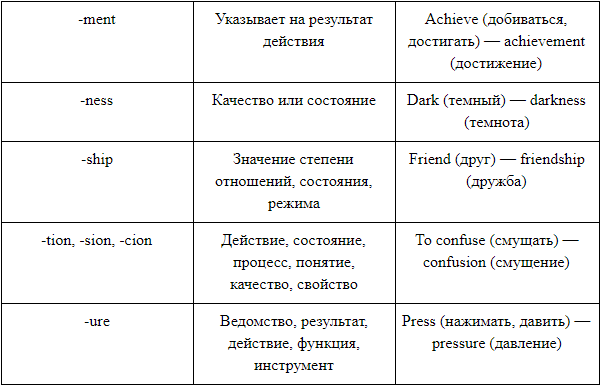
Суффиксы прилагательных в английском языке
Огромное количество прилагательных в английском образованы из существительных и глаголов. Некоторые суффиксы используются для образования и существительных, и прилагательных (например, -al, -ing). Но большинство суффиксов, которые мы встречаем с частью речи, отвечающей на вопрос «какой», не встречаются в существительных или глаголах. Например, суффикс less в английском языке характерен только для прилагательных.
Список суффиксов прилагательных в английском языке, так же, как и в случае с существительными, достаточно обширен.
- -able, -ible. Возможность совершения, выполнения какого-либо действия. Чтобы получилось прилагательное, суффикс добавляют к глаголу. Например, to forget (забывать) — forgettable (незапоминающийся).
- -al. Используется для обозначения признака. Например, accident (случай) — accidental (случайный).
- -ant. Прилагательные, образованные при помощи этого суффикса от глаголов и существительных, означают «передающий качества». Например, please (радовать) — pleasant (приятный).
- -ar. При образовании прилагательных этот суффикс часто прибавляют к существительным или основам латинского происхождения. -Ar используется в значении «иметь качество чего-то» (например, луны, солнца, полюса): lunar (лунный), solar (солнечный), polar (полярный).
- -ary, ory. Используются в обозначении характеристики, качества или отношения к чему-либо. Например, diet (диета) — dietary (диетический).
- -ate. Значение прилагательных с суффиксом -ate, как правило, можно выразить словосочетанием «обладать каким-либо качеством»: affection — affectionate (привязанность — любящий, привязчивый). Этот суффикс также указывает на характеристику. Например, fortune (счастье, удача) — fortunate (счастливый, удачный).
- -ed. Прилагательные с этим суффиксом обычно описывают влияние, оказанное на кого-то или что-то: amaze (поражать, изумлять) — amazed (изумленный).
- -ent. Используется в значении качества: to differ (различаться) — different (разный).
- -ern. Применяется при указании на часть света: south (юг) — southern (южный).
- -ese. Обозначает национальность или территориальную принадлежность. Например, China (Китай) — Chinese (китайский).
- -ful. Этот суффикс в английском превращает существительное в прилагательное, обозначающее «быть наделенным чем-либо, каким-либо свойством». Например, beauty (красота) — beautiful (красивый).
- -ian, ean. Эти суффиксы в английском языке встречаются в прилагательных, выражающих национальную или территориальную принадлежность: Italy (Италия) — Italian (итальянский).
- -ic. Добавляется к существительному и описывает качество: majesty (величие) — majestic (величественный).
- -ical. Обозначает признак: myth (миф) — mythical (мифический).
- -ing. Для образования прилагательных и причастий со значением качества и свойства. Например, to miss (скучать, упускать) — missing (потерянный, отсутствующий).
- -ish. Суффикс используется в прилагательных в значении «приблизительно», также встречается в названиях национальностей, иногда выражает похожесть или принадлежность к чему-либо. Например, child (ребенок) — childish (детский).
- -ive. Употребляется в значении качества, способности: attract (привлекать) — attractive (привлекательный).
- -less. Суффикс less в английском языке служит антонимом суффиксу ful и указывает на отсутствие какого-либо качества: home (дом) — homeless (бездомный).
- -like. Означает похожесть на что-либо, сходство: wave (волна) — wavelike (волнообразный).
- -ly. Для обозначения качества: friend (друг) — friendly (дружелюбный).
- —ous — суффикс, выражающий характеристику: poison (яд) — poisonous (ядовитый).
- -y. Используется в значении «иметь признак»: dirt (грязь) — dirty (грязный).
Глагольные суффиксы
С помощью суффиксов в английском языке из существительных и прилагательных образуется целый ряд глаголов.
Глагольные суффиксы в английском языке: таблица с примерами
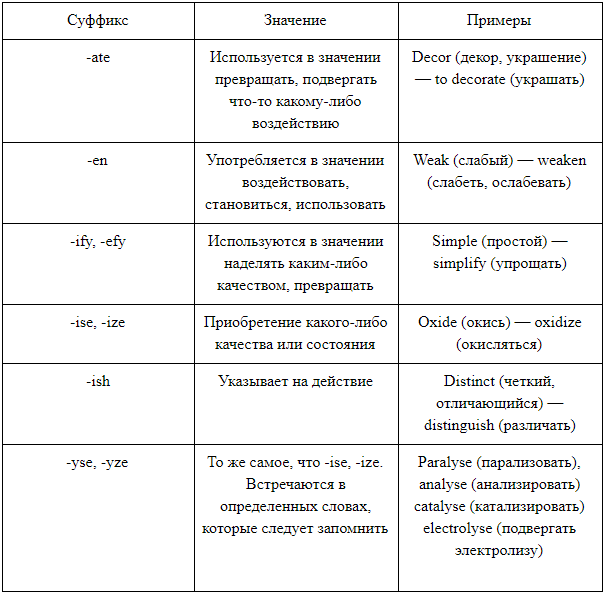
Суффиксы наречий
Словообразование наречий в английском языке — это гораздо более легкий процесс, чем создание существительных и прилагательных. Для того, чтобы получить часть речи, отвечающие на вопросы как, каким образом, обычно достаточно применить один из представленных ниже суффиксов:
- -ly
- wise
- ward/wards
Суффикс ward используется в значении направления: home (дом, дача) — homeward (домой). -Ly указывает на образ действия. Например, true (честный) — truly (честно). -Wise означает способ действия: other (другой) — otherwise (иначе).
Конечно же, вам совершенно необязательно запоминать все суффиксы в английском языке. Постоянная разговорная практика способствует тому, что обучающийся со временем начинает видеть составные части в словах, легко определяя суффиксы, приставки и корни. А понимание основы нового слова позволяет догадаться о его функции в предложении.
With derivational suffixes, the new word has a new meaning, and is usually a different part of speech. But the new meaning is related to the old meaning — it is «derived» from the old meaning.
We can add more than one suffix, as in this example:
promote (verb) + ation → promotion (noun) + al → promotional (adjective)
Here are some of the more common suffixes
Noun suffixes
| Suffix | Meaning | Example |
| -al | action, result of action |
arrival, denial |
| -ment |
condition or result |
disappointment, argument |
| -ist | person or object that does a specified action | Marxist, communist |
| -ism | doctrine, act, practice, condition | Marxism, communism |
| -ity/-ty |
state or quality |
equality, cruelty |
| -ness | state, condition, quality | kindness, happiness, weakness |
| -ee | receiver, performer | nominee, employee, trainee |
| -dom | condition of, state | stardom, boredom, kingdom |
| -age | action or process | bondage, postage, orphanage |
| -ance/-ence | action, state, quality or process | independence, reliance |
| -hood | state, condition, or quality |
neighbourhood, childhood, motherhood |
| -er/-or | person or thing that does something | writer, member, collector |
| -ship | state or condition of, skill of | membership, citizenship |
| -sion/-tion/-xion | state or quality | population, depression, tension |
| -ry | state, condition, or quality | housewifery, pleasantry, robbery |
| -acy | state or quality | adequacy, democracy, supremacy |
| -ess | female | actress, goddess, waitress |
Adjective suffixes
| Suffix | Meaning | Example |
| -en | material | golden, wooden, silken |
| -ese | nationality | Chinese, Japanese |
| -able/-ible | capable of being | audible, edible, drinkable |
| -ful | having, giving, notable for | forgetful, skilful, hopeful |
|
-i |
nationality | Iraqi, Pakistani, Yemeni |
| -al | having the form or character of | formal, thermal, brutal |
| -ic | having the form or character of | poetic, classic |
| -ive |
having the nature of |
productive, informative, active |
|
-ish |
having the character of | childish, newish, Spanish |
|
-less |
without | hopeless, helpless, homeless |
| -ian | relating to | Canadian, utopian, pediatrician |
| -y |
marked by, having |
hungry, rainy, windy |
| -ly | in the manner of | monthly, yearly, fluently |
| -ous | full of | adventurous, famous, courageous |
| -esque | in a manner of or resembling | picturesque, grotesque |
Verb suffixes
| Suffix | Meaning | Example |
| -en | to cause to become | lengthen, soften, harden |
| -ise/-ize | cause, treat, become | fantasise, antagonise, popularise |
| -ate | kind of state | complicate, obstinate, affectionate |
| -ify | cause | specify, clarify, identify |
Adverb suffixes
| Suffix | Meaning | Example |
| -wise | in relation to | otherwise, clockwise, likewise |
| -ly | related to or quality | calmly, easily, quickly |
| -ward(s) | direction | downwards, towards, afterwards |
The meaning of English prefixes
A suffix is a group of letters placed at the end of a word to make a new word. In this article, you will find a list of suffix with their meaning and examples in English.
Noun Suffixes
Learn a useful list of noun suffixes with their meaning and examples in English
-al
- Meaning: Condition, quality
- Examples: dismissal, proposal, arrival, approval, denial, refusal
-ance/-ence
- Meaning: action, state, condition or quality
- Examples: acceptance, attendance, reference preference, insurance, existence
-ation/-tion
- Meaning: the action or resulting state
- Examples: declaration, celebration, information, immigration, education, elimination, combination
-sion
- Meaning: state or being
- Examples: revision, division, revision, profession, depression, confusion, tension, compulsion, confusion, decision, impression
-ure
- Meaning: action or the resulting state
- Examples: erasure, failure, pressure, legislature, departure, enclosure
-age
- Meaning: action, state, process
- Examples: postage, package, baggage, marriage, breakage, passage
-ing
- Meaning: action, state, process
- Examples: landing, writing, ending, seating, blessing, feeding
-ery
- Meaning: a business or trade, a behavior, a condition
- Examples: bakery, creamery, machinery, slavery, brewery
-eer
- Meaning: engaged in something, associated with something
- Examples: volunteer, engineer, musketeer, auctioneer, racketeer, mountaineer, profiteer
-er
- Meaning: someone who performs an action
- Examples: teacher, dancer, helper, farmer, lawyer, jeweler, preacher, prisoner, villager
-ist
- Meaning: person who practices
- Examples: cartoonist, columnist, bicyclist, physicist, violinist, terrorist
-ity
- Meaning: the state or condition of
- Examples: equality, abnormality, probability, civility, stupidity, curiosity, mobility, reality, tranquility, activity
-ment
- Meaning: the action or result of
- Examples: retirement, establishment, movement, abandonment
-ness
- Meaning: a state or quality
- Examples: awareness, kindness, darkness, fondness, happiness, kindness, truthfulness, quietness, sleepiness, usefulness
-or
- Meaning: a person who is something
- Examples: translator, investigator, conductor, distributor
-ship
- Meaning: position held
- Examples: courtship, ownership, internship, worship. partnership, membership, friendship
-th
- Meaning: state or quality
- Examples: labyrinth, warmth, death, strength, width, length, filth, birth, growth, depth
-ty
- Meaning: condition
- Examples: honesty, difficulty, safety, cruelty, subtlety, loyalty, modesty, certainty
-hoop
- Meaning: family terms
- Examples: parenthood, motherhood, childhood
Adjective Suffixes
-able, -ible
- Meaning: capable of being
- Examples: adaptable, predictable, preventable, credible
-al
- Meaning: pertaining to
- Examples: natural, criminal, theatrical, accidental, regional, brutal, personal, regional, universal, seasonal
-ant
- Meaning: inclined to or tending to
- Examples: reliant, defiant, vigilant, brilliant
-ary
- Meaning: of or relating to
- Examples: dietary, planetary, military, honorary, budgetary, complimentary, momentary, honorary, cautionary, customary
-ful
- Meaning: full of or notable of
- Examples: wonderful, fanciful, beautiful, skillful, successful, delightful, awful, grateful
-ic
- Meaning: relating to
- Examples: organic, heroic, poetic, iconic, athletic, basic, scientific, historic, rhythmic, photographic
-ious, -ous
- Meaning: having qualities of
- Examples: cautious, humorous, gracious, fabulous, dangerous, mysterious, nervous, victorious, poisonous, courteous
-ive
- Meaning: quality or nature of
- Examples: expensive, pensive, creative
-less
- Meaning: without something
- Examples: faultless, fearless, restless, useless, friendless, homeless, worthless, penniless, hopeless, powerless
-y
- Meaning: made up of or characterized by
- Examples: fruity, tasty, brainy, grouchy, rainy, funny, messy, dirty, spotty
-ical
- Meaning: having the nature of
- Examples: practical, logical, magical, statistical, alphabetical, historical
-ish
- Meaning: origin, nature
- Examples: sheepish, foolish, childish, selfish, girlish, pinkish
-like
- Meaning: like
- Examples: childlike, birdlike, warlike, lifelike, ladylike
Verb Suffixes
-ed
- Meaning: past-tense version of a verb
- Examples: climbed, missed, laughed, called
-en
- Meaning: become
- Examples: fasten, strengthen, soften, awaken, blacken, broaden, deafen, flatten, gladden, tighten, shorten, sweeten, lengthen, brighten, darken
-er
- Meaning: action or process, making an adjective comparative
- Examples: longer, bigger, fuller, faster
-ing
- Meaning: verb form/present participle of an action
- Examples: swimming, laughing, writing, driving
-ize, -ise
- Meaning: to cause or to become
- Examples: specialize, authorize, commercialize, memorialize, apologize, characterize, digitalize, socialize, symbolize, stabilize, familiarize, advertise, colonize, civilize
-ify, -fy
- Meaning: To make or produce
- Examples: classify, codify, clarify, crucify, defy, falsify, intensify, modify, satisfy, simplify, unify, exemplify, identify, justify, notify, terrify
-ate
- Meaning: To make
- Examples: accommodate, activate, animate, captivate, considerate, consolidate, cooperate, decorate, allocate, concentrate
Adverb Suffixes
-ly
- Meaning: in what manner something is being done
- Examples: bravely, simply, honestly, gladly, lately, rightly, completely, really, definitely, maturely
-ward
- Meaning: in a certain direction
- Examples: backward, wayward, awkward, afterward
-wise
- Meaning: in relation to
- Examples: clockwise, edgewise, lengthwise, otherwise, crosswise, likewise
List of Suffixes | Infographic
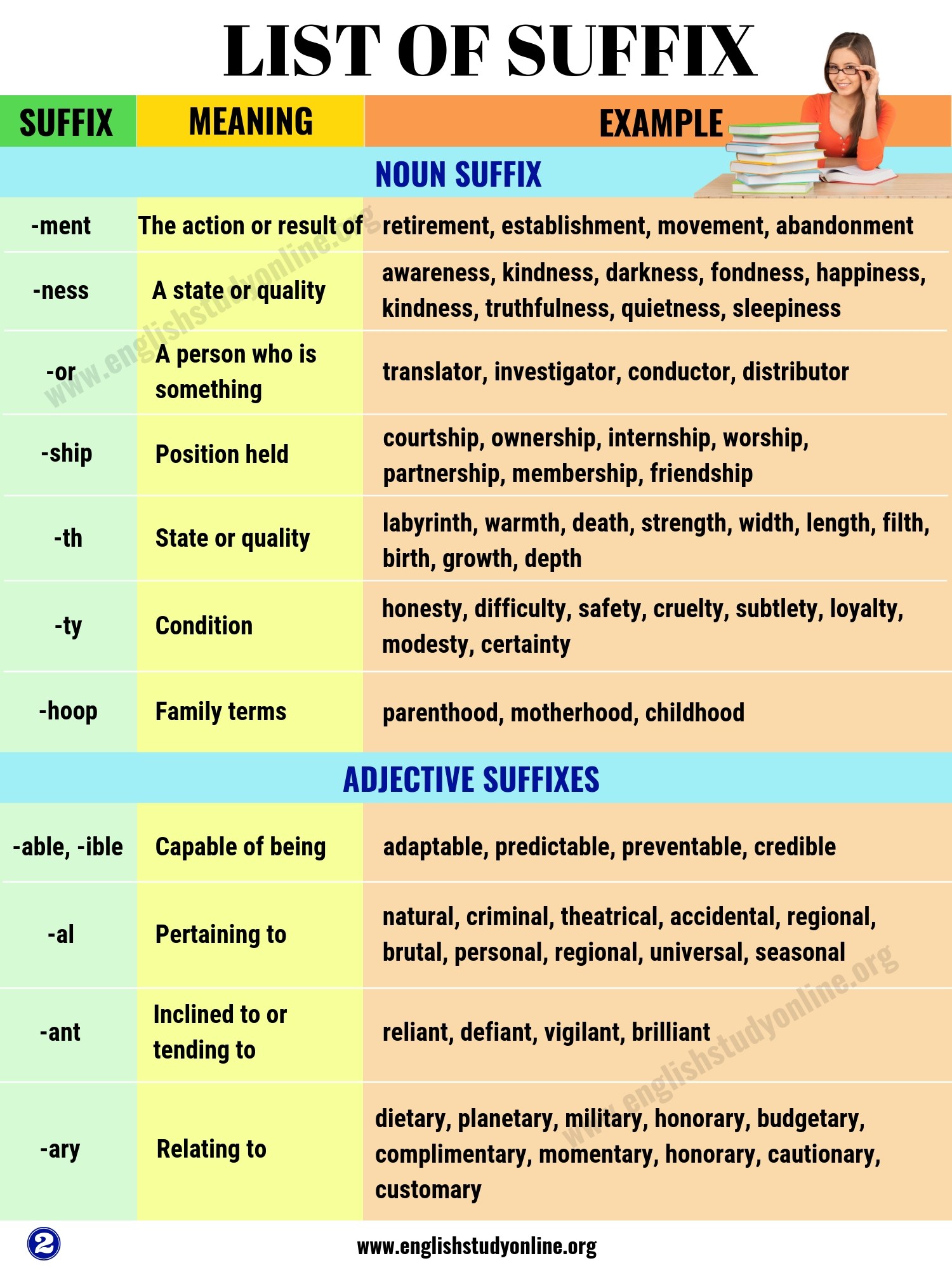
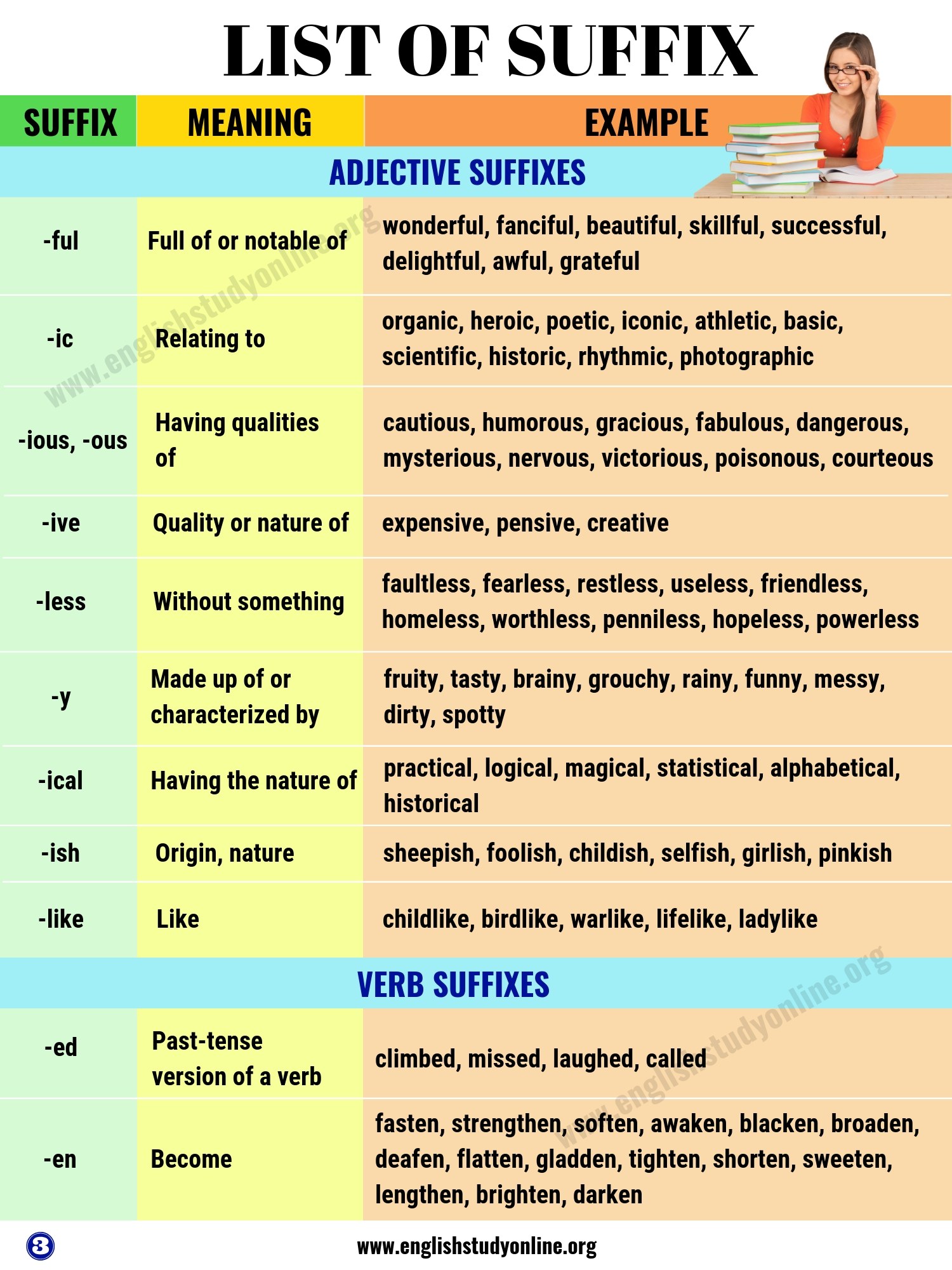

Suffixes: What Are They?
powered by
LanguageTool
Suffixes are “word parts” that can alter many different components of a word. Because of that, it’s vital to know how to use them correctly. We’ll show you how.
What’s a Suffix?
A suffix is a letter or a group of letters that are added to the end of a word. It can change its meaning or grammatical properties. For example, the suffix “-al” can change nouns into adjectives, and “-s” can change nouns from singular to plural.
- Music → Musical
- Phone → Phones
First Things First: What’s an Affix?
To thoroughly understand what suffixes are, you must first be familiar with affixes.
Consider these the alchemists of the spelling and vocabulary world. Affixes are basically “word parts” (morphemes) that are added to the base of a word and have the power to completely alter its meaning or word form.
The two major types of affixes in English are prefixes and suffixes. This blog post will focus on suffixes and tell you what they are, go over the different types, and provide examples.
What Is a Suffix?
A suffix is a type of affix that is found at the end of a word. A suffix can be just one letter or a group of letters.
joyful
joyless
joys
In the examples above, “-ful,” “-less,” and “-s” are suffixes. All of these suffixes serve a different purpose and uniquely change the word. Here are some more examples of suffixes and their meanings:
“-able” means “capable of being” → debatable
“-ful” means “full of” → wonderful
“-hood” means “state or condition of” → puppyhood
“-less” means “without” → defenseless
“-ment” means “action or process of” → encouragement
“-ship” means “state or condition of” → friendship
“-tion” means “action or process of” → hospitalization
“-ity” means “state or quality of” → clarity
“-ize” means “to make or become” → accessorize
This is just a brief list of English suffixes. There are many of them, and each adds to words in different ways. There are different categories of suffixes, though, which we’ll explore below.
What’s the Difference Between a Prefix and a Suffix?
While a suffix is found at the end of a word (e.g., relationship), a prefix is found at the beginning of a word (e.g., disinfect). A few more examples of prefixes include:
- “anti-” (which means “against or opposed to”): Antiviral
- “pre-” (which means “before”): Prerequisite
- “un-” (which means “not or opposite of”): Unstable
Types of Suffixes
In English, there are two different types of suffixes: inflectional suffixes and derivational suffixes.
Inflectional Suffixes
Inflectional suffixes are suffixes that change the grammatical properties of a word, including function, tense, mood, aspect, and more. They do not, however, change the word’s basic meaning or part of speech.
|
Suffix |
Change Made |
Example |
|
“-ed” |
Changes a verb to past tense |
Walk vs. Walked |
|
“-en” |
Changes a verb to past participle (irregular) |
Take vs. (had) Taken |
|
“-er” |
Creates a comparative degree in adjectives and adverbs |
Slow vs. Slower |
|
“-ing” |
Changes a verb to past participle and gerund |
Dance vs. Dancing |
|
“-(e)s” |
Changes noun from singular to plural |
Cat vs. Cats |
|
“-est” |
Creates a superlative degree in adjectives and adverbs |
Slow vs. Slowest |
|
“-(e)s” |
Changes a verb to its third-person present |
Make vs. Makes |
Derivational Suffixes
Derivational suffixes, on the other hand, can create a new word with a different meaning and part of speech. For example, adding “-ly” to “slow” changes it from an adjective to an adverb.
There are two types of derivational suffixes: class-changing derivation and class-maintaining derivation. Those that are class-maintaining create a new word but maintain the part of speech. Here are examples of derivational suffixes and what category they fall under:
|
Suffix |
Changes Made |
Example |
|
“-able/-ible” |
Verbs → Adjectives |
Tolerate vs. Tolerable |
|
“-ant” |
Verbs → Nouns |
Ignore vs. Ignorant |
|
“-ess” |
Word remains a noun |
Actor vs. Actress |
|
“-hood” |
Word remains a noun |
Neighbor vs. Neighborhood |
|
“-ity” |
Adjectives → Nouns |
Absurd vs. Absurdity |
|
“-like” |
Nouns → Adjectives |
Child vs. Childlike |
|
“-ness» |
Adjectives → Nouns |
Dark vs. Darkness |
|
-tion/-ion/-ation |
Verbs → Nouns |
Imagine vs. Imagination |
Keep in mind that roots of a word can have more than one suffix. For instance, the word playfulness has the suffixes “-ful” and “-ness.”
Suffix Rules: Understanding and Using Them Correctly
Please be aware that you can’t just add a suffix to any word. Using suffixes correctly requires a thorough comprehension of their rules and guidelines.
For example, when you’re adding a suffix that starts with a vowel to a word that ends in a final silent “-e,” the final “-e” should be dropped.
imagine + “-able” = imaginable
exercise + “-ing” = exercising
Or, when adding a suffix to a word that ends in a consonant plus “y,” change the “y” to an “i” in most cases.
try + “-ed” = tried
busy + “-ily” = busily
These are just two of the many rules behind using suffixes. Luckily, LanguageTool can ensure proper spelling and use of suffixes. This advanced writing assistant goes beyond checking for errors and also analyzes your text thoroughly to make stylistic recommendations and enhance your writing completely.
It supports more than 30 languages and is free to try!
Suffixes! Following is a list of suffixes in English with their meanings and example sentences to give you an idea of how to identify them.
What are Suffixes?
Suffixes are placed after words to modify their meanings; like prefixes, they are groups of letters that rarely serve a purpose unless attached to a word.
List of Suffixes
- -able/-ible
- -ac/-ic
- -acy
- -acious/-icious
- -al
- -ance/-ence
- -dom
- -eer/-er/-or
- -escent
- -esque
- -fy
- -iferous
- -ise
- -ish
- -ism
- -ist
- -ity
- -less
- -ment
- -oid
- -ose
- -osis
- -ous
- -ship
- -sion/-tion
- -tude
- -y
Suffixes with Meanings and Examples
- -able/-ible
Meaning: capable of
Examples: portable, legible
- -ac/-ic
Meaning: like/related to
Examples: cardiac, Nordic
- -acy
Meaning: state/quality of being
Examples: privacy, legitimacy
- -acious/-icious
Meaning: full of
Examples: gracious, malicious
- -al
Meaning: related to
Examples: logical, philosophical
- -ance/-ence
Meaning: state/quality of being
Examples: maintenance, permanence
- –dom
Meaning: state/quality of being
Examples: freedom, kingdom
- -eer/-er/-or
Meaning: person who
Examples: mountaineer, writer, counsellor
- -escent
Meaning: becoming, to be
Examples: adolescent, fluorescent
- -esque
Meaning: like/reminiscent of
Examples: picturesque, Kafkaesque
- -fy
Meaning: to make
Examples: magnify, electrify
- -iferous
Meaning: containing, yielding
Examples: vociferous, carboniferous
- -ise
Meaning: make, become
Examples: civilise, terrorise
- -ish
Meaning: having qualities of
Examples: hellish, fiendish
- -ism
Meanings: doctrine, belief, practice
Examples: favouritism, communism
- -ist
Meaning: person who
Examples: chemist, florist
- -ity
Meaning: state/quality of being
Examples: ingenuity, oddity
- -less
Meaning: without
Examples brainless, endless
- -ment
Meanings: state/quality of being, result of action
Examples: enjoyment, embankment,
- -ness
Meaning: state of being
Examples: thinness, loneliness
- -oid
Meaning: like
Examples: celluloid, ovoid
- -ose
Meaning: full of
Examples: adipose, verbose
- -osis
Meaning: condition
Examples: hypnosis, psychosis
- -ous
Meaning: full of
Examples: illustrious, nauseous
- -ship
Meaning: position held
Examples: friendship, membership
- -sion/-tion
Meaning: state/quality of being
Examples: torsion, transition
- -tude
Meaning: state/quality of being
Examples: fortitude, certitude
- -y
Meaning: characterised by
Examples: funny, greedy
List of Suffixes | Image
How knowing common suffixes can help you understand what words mean
Updated on February 14, 2020
A suffix is a letter or a group of letters attached to the end of a word to form a new word or to change the grammatical function (or part of speech) of the word. For example, the verb read is made into the noun reader by adding the suffix -er. Similarly, read is made into the adjective readable by adding the suffix -able.
Understanding Suffix Meanings
Understanding the meanings of the common suffixes can help you figure out the meanings of new words you encounter. In some cases, the spelling of a root or base word changes when a suffix is added. For example, in words ending in y preceded by a consonant (such as the noun beauty and the adjective ugly), the y may change to an i when a suffix is added (as in the adjective beautiful and the noun ugliness). In words ending in silent -e (such as use and adore), the final -e may be dropped when the suffix that’s added begins with a vowel (as in usable and adorable).
As with all spelling rules, there are exceptions. Not all suffixes can be added to all roots. For example, the adjective beautiful is formed by adding the suffix -ful to the noun beauty, and the noun ugliness is formed by adding the suffix -ness to the adjective ugly.
Also note that a suffix may have more than one meaning. With adjectives and adverbs, for instance, the —er suffix usually conveys the comparative meaning of «more» (as in the adjectives kinder and longer). But in some cases, the -er ending can also refer to someone who performs a particular action (such as a dancer or builder) or to someone who lives in a particular place (such as a New Yorker or a Dubliner).
Common Suffixes in English
Think of the 26 common suffixes that follow as clues to the meanings of words, however, bear in mind that the meanings of words are best determined by studying the contexts in which they are used as well as the construction of the words themselves.
Noun Suffixes:
| Suffix | Meaning | Example |
| -acy | state or quality | privacy, fallacy, delicacy |
| -al | act or process of | refusal, recital, rebuttal |
| -ance, -ence | state or quality of | maintenance, eminence, assurance |
| -dom | place or state of being | freedom, kingdom, boredom |
| -er, -or | one who | trainer, protector, narrator |
| -ism | doctrine, belief | communism, narcissism, skepticism |
| -ist | one who | chemist, narcissist, plagiarist |
| -ity, -ty | quality of | inactivity, veracity, parity, serenity |
| -ment | condition of | argument, endorsement, punishment |
| -ness | state of being | heaviness, sadness, rudeness, testiness |
| -ship | position held | fellowship, ownership, kinship, internship |
| -sion, -tion | state of being | concession, transition, abbreviation |
Verb Suffixes:
| Suffix | Meaning | Example |
| -ate | become | regulate, eradicate, enunciate, repudiate |
| -en | become | enlighten, awaken, strengthen |
| -ify, -fy | make or become | terrify, satisfy, rectify, exemplify |
| -ize, -ise* | become | civilize, humanize, socialize, valorize |
Adjective Suffixes:
| Suffix | Meaning | Example |
| -able, -ible | capable of being | edible, presentable, abominable, credible |
| -al | pertaining to | regional, grammatical, emotional, coastal |
| -esque | reminiscent of | picturesque, statuesque, burlesque |
| -ful | notable for | fanciful, resentful, woeful, doubtful |
| -ic, -ical | pertaining to | musical, mythic, domestic, chiastic |
| -ious, -ous | characterized by | nutritious, portentous, studious |
| -ish | having the quality of | fiendish, childish, snobbish |
| -ive | having the nature of | creative, punitive, divisive, decisive |
| -less | without | endless, ageless, lawless, effortless |
| -y | characterized by | sleazy, hasty, greasy, nerdy, smelly |
In American English, verbs end with -ize, versus British English, in which the spelling changes to —ise.
- American English: finalize, realize, emphasize, standardize
- British English: finalise, realise, emphasise, standardise
100 Suffix Words (Meanings & Examples)
One of the best ways to improve your English skills is to learn common suffixes and how to use them. A suffix is a letter or group of letters added to the end of a word to change its meaning.
For example, adding -er to the word “walk” changes it to “walker,” which refers to someone who walks for a living.
In this blog post, we’ll look at 100 different suffixes and their meaning. By the end, you’ll have a better understanding of how English words are formed and be able to use suffixes correctly in your own writing. Let’s get started!
Suffix Words and Meaning
- -able: capable of, able to
- -al: relating to
- -ance/ence: the act of, state of
- -ant: one who does something
- -ar: pertaining to
- -ary: place where something happens or is done
- -ate: to make something do something
- -ation: the result of doing something
- -er: someone or something that does something
- -est: most
- -ful: full of, having a lot of
- -ible/able: capable of being
- -ic: like, pertaining to
- -ical: actual, real
- -ine: a kind of
- -ion: the act of, result of
- -ity: state or quality of
- -ive: having the ability to
- -less: without
- -ly: in a certain way
- -ness: state or quality of
- -or: someone who does something
- -ous: full of, characterized by
- -ship: the state or condition of being
- -ward(s): toward(s), moving in a certain direction
- -al: a kind of
- -ar: a kind of
- -cy: state or quality of
- -ian: relating to
- -ity: state or quality of
- -like: resembling
- -ly: in a certain way
- -ness: state or quality of
- -ose: full of, characterized by
- -ous: full of, characterized by
- -tain: to have or hold
- -tion: the act of having or holding something
Suffixes Words and Examples
- -able: capable, reusable
- -al: financial, elemental
- -ance: endurance, performance
- -ant: assistant, dependant
- -ar: stellar, occurs every year
- -ary: school, factory
- -ate: activate, incubate
- -ation: activation, incubation
- -er: worker, referrer
- -est: largest, best
- -ful: helpful, harmful
- -ible: convertible, reversible
- -ic: organic, basic
- –ical: Historical, actual
- -ine: Marine, heroine
- –ion: Nation, solution
- -ive: active, passive
- -less: careless, hopeless
- -ly: friendly, manly
- -ness: kindness, darkness
- -or: instructor, performer
- -ous: curious, dangerous
- –ship: friendship, leadership
- -ward(s): forward, northward
- -al: national, retail
- -ar: junior, senior
- -cy: secrecy, fluency
About The Author
From Wikipedia, the free encyclopedia
In linguistics, a suffix is an affix which is placed after the stem of a word. Common examples are case endings, which indicate the grammatical case of nouns, adjectives, and verb endings, which form the conjugation of verbs. Suffixes can carry grammatical information (inflectional suffixes) or lexical information (derivational/lexical suffixes). An inflectional suffix or a grammatical suffix.[1] Such inflection changes the grammatical properties of a word within its syntactic category. For derivational suffixes, they can be divided into two categories: class-changing derivation and class-maintaining derivation.
Particularly in the study of Semitic languages, suffixes are called affirmatives, as they can alter the form of the words. In Indo-European studies, a distinction is made between suffixes and endings (see Proto-Indo-European root). Suffixes can carry grammatical information or lexical information.
A word-final segment that is somewhere between a free morpheme and a bound morpheme is known as a suffixoid[2] or a semi-suffix[3] (e.g., English -like or German -freundlich «friendly»).
Examples[edit]
English[edit]
- Girls—where the suffix -s marks the plurality.
- He makes—where suffix -s marks the third person singular present tense.
- It closed—where the suffix -ed marks the past tense.
French[edit]
- De beaux jours—where the suffix -x marks the plural.
- Elle est passablement jolie—where the suffix -e marks the feminine form of the adjective.
German[edit]
- mein Computer—where the lack of suffixes is because its case, nominative, is «unmarked»
- meines Computers—genitive case
- meinem Computer—dative case
- meinen Computer—accusative case
Russian[edit]
- мой компьютер—where the lack of suffixes is because its case, nominative, is «unmarked»
- моего компьютера—genitive case
- моему компьютеру—dative case
- мой компьютер—accusative case
- за-туш-и-ть свечу—where first word has -и- suffix, -ть ending (infinitive form); second word with ending -у (accusative case, singular, feminine).
- добр-о-жел-а-тель-н-ый—добр- root, -о- interfix, -жел- root, verbal -a- interfix, nominal -тель suffix, adjectival -н- suffix, adjectival -ый ending (nominative case, singular, masculine).
Barngarla[edit]
- wárraidya «emu» — where the lack of suffixes is because its grammatical number, singular, is «unmarked»
- wárraidyalbili «two emus» — dual
- wárraidyarri «emus» — plural
- wárraidyailyarranha «a lot of emus», «heaps of emus» — superplural[4]: 227–228
Inflectional suffixes[edit]
Inflection changes the grammatical properties of a word within its syntactic category. In the example:
- I was hoping the cloth wouldn’t fade, but it has faded quite a bit.
the suffix -d inflects the root-word fade to indicate past participle.
Inflectional suffixes do not change the word class of the word after the inflection.[5] Inflectional suffixes in Modern English include:
Verbs[edit]
- -s third person singular simple present tense
- -ed past tense and past participle
- -t past tense (weak irregular)
- -ing present participle and gerund
- -en past participle (irregular)
Nouns[edit]
- -s plural number
- -en plural number (irregular)
Adjectives and Adverbs[edit]
- -er comparative degree
- -est superlative degree
Derivation[edit]
Derivational suffixes can be divided into two categories: class-changing derivation and class-maintaining derivation.[6] In English, they include
- -ise/-ize (usually changes nouns into verbs)
- -fy (usually changes nouns into verbs)
- -ly (usually changes adjectives into adverbs, but also some nouns into adjectives)
- -ful (usually changes nouns into adjectives)
- -able/-ible (usually changes verbs into adjectives)
- -hood (usually class-maintaining, with the word class remaining a noun)
- -ess (usually class-maintaining, with the word class remaining a noun)
- -ness (usually changes adjectives into nouns)
- -less (usually changes nouns into adjectives)
- -ism (usually class-maintaining, with the word class remaining a noun)
- -ment (usually changes verbs into nouns)
- -ist (usually class-maintaining, with the word class remaining a noun)
- -al (usually changes nouns into adjectives)
- -ish (usually changes nouns into adjectives/ class-maintaining, with the word class remaining an adjective)
- -oid (usually changes nouns into adjectives)
- -like (usually changes nouns into adjectives)
- -ity (usually changes adjectives into nouns)
- -tion/-ion/ation (usually changes verbs into noun)
- -logy/-ology (usually class-maintaining, with the word class remaining a noun)
- -ant (usually changes verbs into nouns, often referring to a human agent)
Altered Proununciation in English[edit]
A suffix will often change the stress or accent pattern of a multi-syllable word, altering the phoneme pattern of the root word even if the root’s morphology does not change. [7] An example is the difference between «photograph» and «photography.» In this case, the «-fy» ending governs the stress pattern, causing the primary stress to shift from the first syllable («-pho») to the antepenultimate («-to»). The unaccented syllables have their ordinary vowel sound changed to a schwa. This can be a particular problem for dyslexics, affecting their phonemic awareness, [8] as well as a hurdle for non-native speakers.
Synthetic languages[edit]
Many synthetic languages—Czech, German, Finnish, Latin, Hungarian, Russian, Turkish, etc.—use many endings.
References[edit]
- ^ Mead, Jonathan (1993). Proceedings of the 11th West Coast Conference on Formal Linguistics. Center for the Study of Language (CSLI). ISBN 978-1-881526-12-4.
- ^ Kremer, Marion. 1997. Person reference and gender in translation: a contrastive investigation of English and German. Tübingen: Gunter Narr, p. 69, note 11.
- ^ Marchand, Hans. 1969. The categories and types of present-day English word-formation: A synchronic-diachronic approach. Munich: Beck, pp. 356 ff.
- ^ Zuckermann, Ghil’ad 2020, Revivalistics: From the Genesis of Israeli to Language Reclamation in Australia and Beyond, Oxford University Press. ISBN 9780199812790 / ISBN 9780199812776
- ^ Jackson and Amvela (2000): Word, Meaning and Vocabulary; An Introduction to Modern English Lexicology. London, Athenaeum Press, p. 83
- ^ Jackson and Amvela (2000): Word, Meaning and Vocabulary; An Introduction to Modern English Lexicology. London, Athenaeum Press, p. 88
- ^ Nancy K. Lewkowicz, «Pronouncing Longer Words: Don’t Begin at the Beginning.» Journal of Reading, Vol. 29, No. 3 (Dec., 1985), 226-237. https://www.jstor.org/stable/40029663
- ^ «Dyslexia Help: Success Starts Here.» University of Michigan. http://dyslexiahelp.umich.edu/professionals/learn-about-dyslexia/diagnosing-dyslexia
External links[edit]
Media related to Suffixes at Wikimedia Commons

